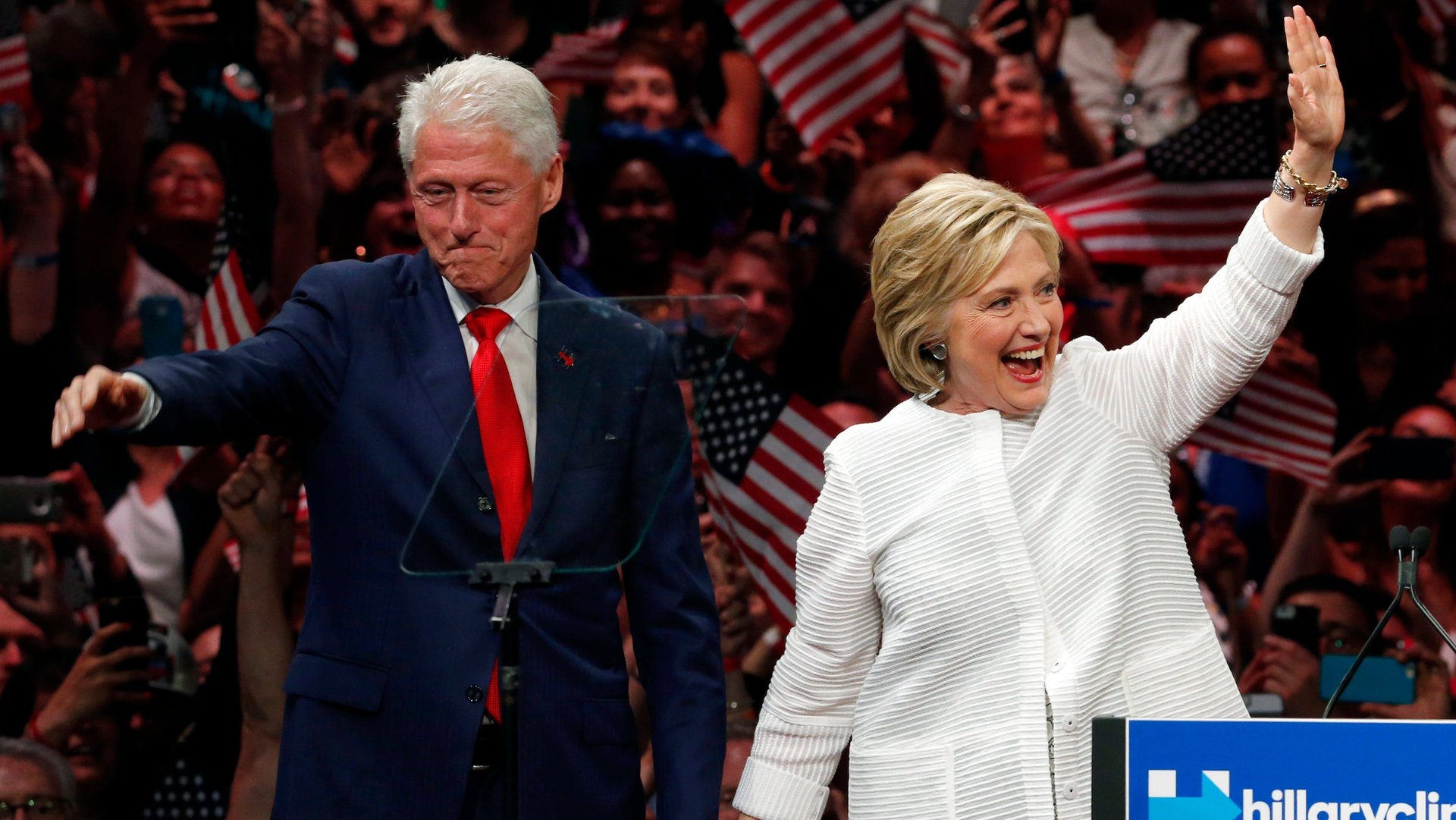Bill Clinton proves Americans still lose their minds when a man puts his wife’s career first
Not too long ago, Americans tended to be wary of male politicians who were married to ambitious, working women. Back in 1992, when her husband was running for president, many found the professional success of prospective first lady Hillary Clinton off-putting and suspicious. She famously got into trouble for an offhand comment that suggested she preferred pursuing a career over staying home and baking cookies. As part of her public penance, and to provide proof of her femininity, she had to release her own cookie recipe.


Not too long ago, Americans tended to be wary of male politicians who were married to ambitious, working women. Back in 1992, when her husband was running for president, many found the professional success of prospective first lady Hillary Clinton off-putting and suspicious. She famously got into trouble for an offhand comment that suggested she preferred pursuing a career over staying home and baking cookies. As part of her public penance, and to provide proof of her femininity, she had to release her own cookie recipe.
In years since, male politicians with professionally accomplished wives have become the norm—and more women have themselves entered the political arena. As Hillary Clinton makes history as the first female presidential nominee of a major political party, it’s worth looking at how far politics has come in accepting working women as role models and leaders, and how far we still have to go.
It is perhaps unsurprising that a lot of high-profile male Democrats have professional spouses. Sen. Tim Kaine’s wife, Anne Holton, is a lawyer and judge who just stepped down as Virginia’s secretary of education. Sen. Bernie Sanders’ wife, Jane O’Meara Sanders, served as president of Burlington College and told a reporter that, when she finally joined her husband in Washington, DC, “I fit in better with the congressmen than their spouses.”
Nowadays, many high-profile male Republicans have professional wives, too. Social conservative and Texas congressman Ted Cruz is married to a woman with two master’s degrees, including an MBA from Harvard, and who went on to become a big-shot at Goldman Sachs. Even a heartland family values guy like Indiana governor Mike Pence, who once groused about the effects of working moms on kids, is not immune to this trend. His wife Karen, also a mom, taught school for 25 years. In 1992, the New York Times reported, “Republicans are busy mining fears as old as Adam and Eve about the dangers of an assertive, ambitious woman speaking into the ear of her man.” But in 2016, no one is accusing Heidi Cruz or Karen Pence of neglecting their families. We have yet to see the media press Melania Trump to produce a recipe for homemade snickerdoodles.
That is not to say we’re making a smooth transition into a world in which women’s professional pursuits are taken as seriously as men’s. As evidence, one need only look at Bill Clinton’s remarkable speech honoring Hillary last night.
The speech itself was an effective paean to an impressive woman. Former president Bill Clinton extolled his wife’s virtues and accomplishments, emphasizing her hard work, dedication, intelligence, and commitment to social justice. Hillary, he bragged, “had done more positive change-making before she was 30 than many public officials do in a lifetime.” And although he didn’t use the word “feminism” once, he didn’t have to. Feminist values saturated the speech, just as those same values have saturated the nation at large. They are shared by Clinton’s running mate and her rivals who, as Jill Filipovic astutely observes, want autonomy and possibility for their daughters, if not their wives.
The response to the speech was also revealing. Commentators and laymen alike applauded Bill for singing Hillary’s praises. But as Emily Crockett dryly put it at Vox, all he did was “what every good presidential spouse is supposed to do.” Going wild about a man who acknowledges the importance and value of his wife’s work seems a little out of proportion, akin to the giving dads gold stars for such tasks as doing the dishes or putting the kids to bed.
Meanwhile, it’s still taken for granted that women should take on the emotional labor of talking up their spouses’ achievements—the same way it is taken for granted that wives should hold down the home front while husbands travel, entertain clients, or celebrate with colleagues after work. Former president Clinton’s speech got so much attention in part because it deviated from that formula. We are so accustomed to wives promoting their husbands’ careers while downplaying their own that it is startling to see the roles reversed—even for the length of a single convention speech. Likewise, when last year’s biography of Supreme Court justice Ruth Bader Ginsburg revealed the extent to which Ginsburg’s husband Marty assisted in and insisted upon his wife’s success, even at his own expense, he become something of a folk hero.
In some ways, we are all feminists now—whether we acknowledge it or not. But there is still plenty of work to be done. The partnership between Bill and Hillary serves as a reminder that we are still in the process of becoming comfortable, as a country, with a woman who has her own ambitions and demands our attention—and who doesn’t placate us with cookies.